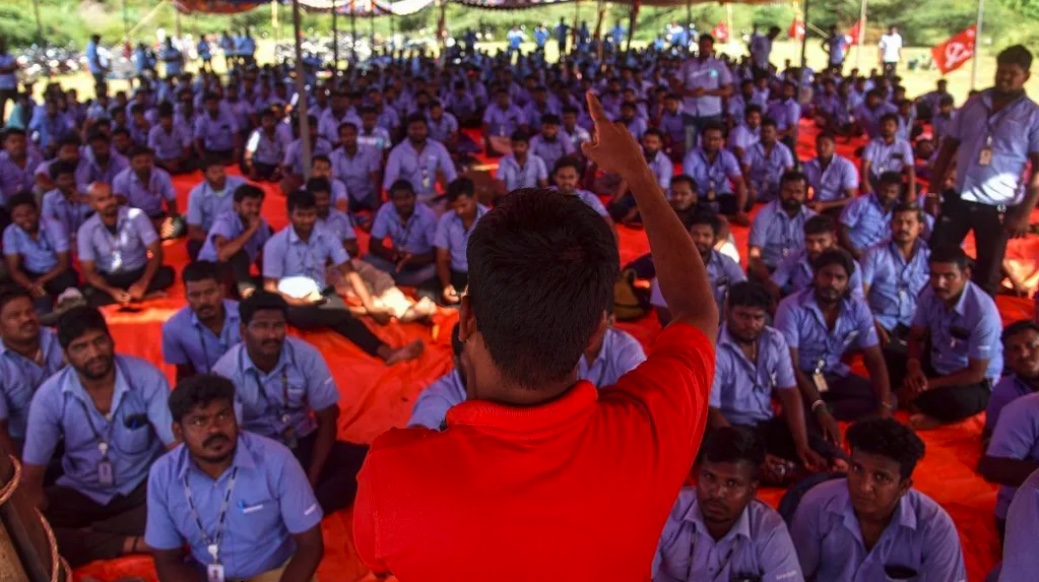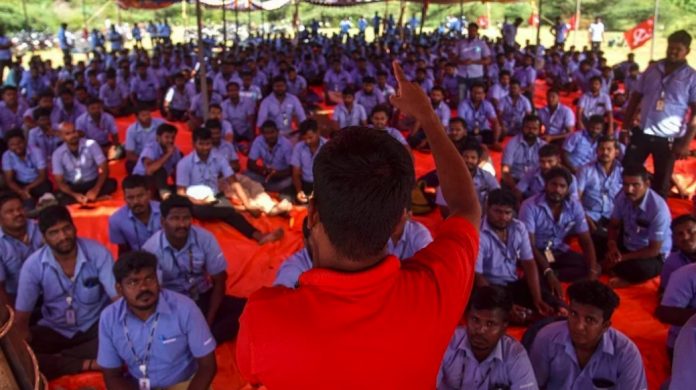เป็นเวลานานกว่า 11 วันที่ผ่านมา พนักงานราว 1,500 คนของบริษัท Samsung Electronics ยักษ์ใหญ่ด้านเทคโนโลยีจากเกาหลีใต้ได้หยุดงานประท้วงในรัฐทมิฬนาฑู ทางตอนใต้ของอินเดีย ซึ่งส่งผลให้การผลิตหยุดชะงักอย่างมาก
โรงงานที่ตั้งอยู่ในเมืองเชนไน ซึ่งเป็นหนึ่งในสองโรงงานของ Samsung ในอินเดีย มีพนักงานเกือบ 2,000 คนและผลิตเครื่องใช้ไฟฟ้าภายในบ้าน ซึ่งมีส่วนสำคัญในการสร้างรายได้ประมาณหนึ่งในสามจากรายได้ประจำปีของบริษัทที่ 12,000 ล้านดอลลาร์สหรัฐ (9,000 ล้านปอนด์) ในอินเดีย
กลุ่มพนักงานที่ประท้วงรวมตัวกันทุกวันที่พื้นที่ใกล้กับโรงงานที่เปิดมาแล้ว 17 ปี โดยพวกเขาเรียกร้องให้ Samsung ยอมรับสหภาพแรงงานใหม่ที่พวกเขาก่อตั้งขึ้น ชื่อว่า “สหภาพสวัสดิการแรงงาน Samsung อินเดีย” (Samsung India Labour Welfare Union หรือ SILWU) โดยพนักงานกล่าวว่าสหภาพแรงงานเท่านั้นที่จะช่วยให้พวกเขาสามารถเจรจาค่าแรงและชั่วโมงการทำงานที่ดีกับผู้บริหารได้
การประท้วงครั้งนี้นับเป็นหนึ่งในการประท้วงที่ใหญ่ที่สุดที่ Samsung ได้พบเจอในช่วงไม่กี่ปีที่ผ่านมา แม้ขณะเดียวกัน นายกรัฐมนตรีนเรนทรา โมดีของอินเดียจะพยายามดึงดูดการลงทุนจากต่างประเทศโดยการโปรโมทว่าอินเดียเป็นทางเลือกที่เหมาะสมแทนจีนในการผลิต
Samsung India ได้ออกแถลงการณ์ว่าความเป็นอยู่ของพนักงานเป็นสิ่งที่บริษัทให้ความสำคัญที่สุด “เราได้เริ่มการเจรจากับพนักงานที่โรงงานเชนไนเพื่อแก้ไขปัญหาทั้งหมดในเร็วที่สุด” แถลงการณ์ระบุ
ก่อนหน้านี้ไม่นาน ตำรวจได้ควบคุมตัวพนักงานประมาณ 104 คนที่เดินขบวนประท้วงโดยไม่ได้รับอนุญาต แต่พวกเขาก็ถูกปล่อยตัวในช่วงเย็น
“พนักงานตัดสินใจที่จะหยุดงานไม่มีกำหนดจนกว่าข้อเรียกร้องของพวกเขาจะได้รับการตอบสนอง” เอ. ซอนดาราราจัน สมาชิกของสหภาพแรงงานอินเดีย (Citu) ซึ่งได้รับการสนับสนุนจากพรรคคอมมิวนิสต์แห่งอินเดีย (มาร์กซิสต์) กล่าว Citu ได้สนับสนุนสหภาพแรงงานใหม่ที่ก่อตั้งในโรงงานแห่งนี้
พนักงานมีข้อเรียกร้องสำคัญ 3 ข้อ ได้แก่ Samsung ต้องยอมรับสหภาพแรงงานใหม่ อนุญาตให้มีการเจรจาต่อรองร่วมกัน และปฏิเสธสหภาพแรงงานอื่น เนื่องจากพนักงานประมาณ 90% ของโรงงานนี้เป็นสมาชิกของ SILWU ซอนดาราราจันกล่าว
พนักงานซึ่งมีรายได้เฉลี่ย 25,000 รูปี (298 ดอลลาร์สหรัฐ หรือ 226 ปอนด์) ต่อเดือน กำลังเรียกร้องการขึ้นค่าแรงแบบค่อยเป็นค่อยไป โดยเพิ่มขึ้นรวม 50% ในช่วงสามปีข้างหน้า ตามที่ Citu ระบุ
Citu ยังกล่าวหาว่าพนักงานที่โรงงานถูก “กดดันให้ผลิตสินค้าแต่ละชิ้น เช่น ตู้เย็น เครื่องซักผ้า หรือโทรทัศน์ ภายในเวลา 10-15 วินาที” ต้องทำงานติดต่อกัน 4-5 ชั่วโมงโดยไม่หยุดพัก และต้องทำงานในสภาพที่ไม่ปลอดภัย
ซอนดาราราจันยังกล่าวหาว่าผู้บริหารของโรงงานกดดันให้พนักงานลาออกจากสหภาพแรงงานใหม่ และยังข่มขู่ครอบครัวของพนักงานอีกด้วย
ทาง BBC ได้ส่งชุดคำถามไปยัง Samsung India เพื่อขอคำตอบในประเด็นเหล่านี้
ขณะเดียวกัน รัฐมนตรีว่าการกระทรวงสวัสดิการแรงงานของรัฐทมิฬนาฑู ซี.วี. คานีซาน กล่าวว่าเขาได้ให้ความมั่นใจกับเจ้าหน้าที่สหภาพแรงงานแล้วว่ากำลังมีการเจรจาเพื่อแก้ไขปัญหา “เราจะทำตามข้อเรียกร้องของพนักงาน” เขากล่าว
ซิโจ* หนึ่งในผู้ประท้วงกล่าวว่า เขามาถึงจุดประท้วงทุกวันในเวลา 08:00 น. ตามเวลาท้องถิ่น (02:30 GMT) และอยู่จนถึง 17:00 น. โดยเข้าร่วมกับพนักงานอีกหลายร้อยคนที่สวมเครื่องแบบสีฟ้าของ Samsung India
ทางสหภาพแรงงานจัดหาอาหารกลางวันและน้ำดื่มให้กับผู้ประท้วง ขณะที่เต็นท์ผ้าชั่วคราวปกป้องพวกเขาจากสภาพอากาศ นอกจากนี้ยังไม่มีห้องน้ำ จึงทำให้พนักงานต้องใช้พื้นที่กลางแจ้งแทน
“ตั้งแต่โรงงานนี้เริ่มเปิด พนักงานทำงานโดยไม่มีการร้องเรียนหรือมีสหภาพแรงงาน แต่สิ่งต่าง ๆ เริ่มแย่ลงในช่วงไม่กี่ปีที่ผ่านมา ตอนนี้เราจำเป็นต้องได้รับการสนับสนุนจากสหภาพแรงงาน” ซิโจกล่าว
เขาเสริมว่าเงินเดือนของเขาไม่ได้เพิ่มขึ้นตามค่าครองชีพ ซึ่งทำให้การเงินของครอบครัวเขาตึงตัว
จนถึงปี 2020 กลุ่ม Samsung เป็นที่รู้กันว่าไม่อนุญาตให้มีสหภาพแรงงานเพื่อเป็นตัวแทนของพนักงาน แต่สิ่งนี้ได้เปลี่ยนไปหลังจากที่บริษัทถูกจับตามองอย่างหนักจากสาธารณชนเมื่อประธานบริษัทถูกดำเนินคดีในข้อหาการบิดเบือนตลาดและการติดสินบน
แรงงานอินเดียหลายล้านคนเข้าร่วมสหภาพแรงงาน ซึ่งมักได้รับการสนับสนุนจากพรรคการเมืองฝ่ายซ้าย ซึ่งใช้พลังทางการเมืองของพวกเขาเพื่อบังคับใช้กฎหมายแรงงานและเจรจาเพื่อปรับปรุงสภาพการทำงาน “บริษัทต่างประเทศเข้ามาตั้งฐานในอินเดีย แต่ต่อต้านการปฏิบัติตามกฎหมายท้องถิ่นเกี่ยวกับสิทธิแรงงานในการรวมกลุ่มและเจรจาต่อรองร่วม” ซอนดาราราจันกล่าวหา
บริษัทข้ามชาติที่มีชื่อเสียงหลายแห่ง รวมถึง Apple และ Amazon ได้ตั้งโรงงานในอินเดีย แต่กลุ่มนักเคลื่อนไหวด้านสิทธิแรงงานกล่าวหาว่าหลายบริษัทเหล่านี้จ่ายเงินต่ำและบังคับให้พนักงานทำงานหนักเกินไป และสมคบกับรัฐบาลของรัฐในการปราบปรามสิทธิของแรงงาน
ชยาม สุนดาร์ นักเศรษฐศาสตร์ด้านแรงงานกล่าวว่า บริษัทข้ามชาติใช้กลยุทธ์ด้านทรัพยากรบุคคลหลายรูปแบบในการป้องกันไม่ให้พนักงานจัดตั้งสหภาพแรงงานในประเทศกำลังพัฒนาอย่างอินเดีย
วิธีหนึ่งคือการต่อต้านการที่พนักงานเข้าร่วมกับสหภาพแรงงานที่ได้รับการสนับสนุนจากการเมืองภายนอกอย่างหนัก และสนับสนุนให้พวกเขาจัดตั้งสหภาพแรงงาน “นำโดยคนงาน” ภายในแทน “นี่ทำให้ผู้บริหารมีอำนาจควบคุมกิจกรรมของสหภาพแรงงานได้บ้าง” สุนดาร์กล่าว
ซอนดาราราจันกล่าวหาว่าผู้บริหารที่โรงงานในเชนไนได้เสนอวิธีแก้ปัญหานี้กับพนักงาน ซึ่งพวกเขาปฏิเสธ BBC ได้ติดต่อไปยัง Samsung India เพื่อขอคำตอบในประเด็นนี้เช่นกัน
วิธีที่สอง สุนดาร์กล่าว คือการจ้างพนักงานอายุน้อยที่ไม่มีทักษะ โดยเฉพาะจากพื้นที่ชนบท ด้วยการดึงดูดพวกเขาด้วยเงินเดือนเริ่มต้นที่ดี “พนักงาน ‘ฝึกงาน’ เหล่านี้ได้รับคำสัญญาว่าจะได้เป็นพนักงานถาวรหลังจากผ่านไปไม่กี่เดือน แต่สิ่งนี้ไม่เคยเกิดขึ้น ค่าเงินเดือนก็ยังคงอยู่ในระดับเดิมหรือน้อยมาก”
การเติบโตอย่างรวดเร็วของ “แรงงานยืดหยุ่น” หรือพนักงานที่จ้างเป็นสัญญาจ้าง กลายเป็นกลยุทธ์สำคัญของบริษัทข้ามชาติในการป้องกันไม่ให้เกิดการจัดตั้งสหภาพแรงงาน โดยทำให้แรงงานยอมทำตามผู้บริหารได้ง่าย เขากล่าวเพิ่มเติม
ตามสถิติล่าสุดของรัฐบาล พบว่าในปี 2022 พนักงานในโรงงานในอินเดีย 2 ใน 5 คนเป็นแรงงานตามสัญญาจ้าง ซึ่งคิดเป็นประมาณ 40% ของแรงงานในสถานประกอบการอุตสาหกรรม
“บริษัทต่าง ๆ ใช้การข่มขู่เรื่องการย้ายที่ตั้งหรือไม่ขยายกิจการเพื่อกดดันให้รัฐบาลของรัฐไม่บังคับใช้กฎหมายแรงงาน” นายสุนดาร์กล่าว “แต่พนักงานสามารถใช้เครือข่ายสหภาพแรงงานระดับโลกกดดันบริษัทให้ปฏิบัติตามกฎหมายแรงงานระหว่างประเทศได้” เขาเสริม
*ทั้งหมดเป็นนามสมมติเพื่อปกป้องตัวตนของพนักงาน
Why hundreds of Samsung workers are protesting in India

For the past 11 days, about 1,500 workers of South Korean technology giant Samsung Electronics have been striking work in the southern Indian state of Tamil Nadu, leading to major disruptions in production.
The plant in Chennai city, one of Samsung’s two factories in India, employs nearly 2,000 workers and produces home appliances, contributing about a third to the company’s annual $12bn (£9bn) revenue in India.
The striking workers gather at a plot of land near the 17-year-old factory daily, demanding that Samsung recognise their newly-formed labour union – the Samsung India Labour Welfare Union (SILWU). They say that only a union can help them negotiate better wages and working hours with the management.
The protest, one of the largest Samsung has seen in recent years, comes even as Prime Minister Narendra Modi has been courting foreign investment by positioning India as a viable alternative to China for manufacturing activities.
Samsung India has released a statement saying that the welfare of its workers was its top priority. “We have initiated discussions with our workers at the Chennai plant to resolve all issues at the earliest,” it said.
Hours earlier, the police had detained around 104 workers for undertaking a protest march without permission. The protesters were released in the evening.
“The workers have decided to strike work indefinitely till their demands are met,” said A Soundararajan, member of Centre of Indian Trade Unions (Citu), backed by the Communist Party of India (Marxist). Citu has backed the new union in the factory.
The workers have three key demands: Samsung must recognise the new union, allow collective bargaining, and reject competing unions as about 90% of the workforce belongs to SILWU, said Mr Soundararajan.
Workers, earning an average of 25,000 rupees ($298; £226) a month, are demanding staggered raises totalling a 50% increase over the next three years, according to Citu.
Citu also alleged that workers at the plant were being “pressurised to finish each product – like a refrigerator, washing machine, or TV – within 10-15 seconds”, work non-stop for four to five hours at a stretch, and do their jobs in unsafe conditions.
Mr Soundararajan also alleged that workers were pressurised by the management to leave the new union and that their families were threatened as well.
The BBC has sent Samsung India a detailed set of questions for a response.
Meanwhile, Tamil Nadu’s Labour Welfare Minister CV Ganesan said he had assured union officials that talks were under way to resolve their issues. “We will fulfil the demands of the workers,” he said.
Sijo*, a protester, said that he arrives at the protest site daily at 08:00 IST (02:30 GMT) and stays until 17:00, joining hundreds of workers in their blue Samsung India uniforms.
The union arranges for lunch and water for the protesters, while a makeshift cloth tent protects them from the elements. There are no washroom facilities, so the workers use the outdoors.
“Since the factory was set up, employees have been working without complaints or a union. But things have been getting bad over the past couple of years, and now, we need the support of a union,” Sijo said.
He added that his pay doesn’t keep pace with the cost of living and that this has put a strain of his family’s finances.
Up until 2020, the Samsung Group was known for not allowing unions to represent its workers. But things changed after the company came under intense public scrutiny after its chairman was prosecuted for market manipulation and bribery.
Millions of Indian workers join trade unions – often backed by leftist parties – who use their political clout to enforce labour laws and negotiate better conditions. “Foreign companies set up in India but resist following local laws on workers’ rights to association and collective bargaining,” alleged Mr Soundararajan.
Many prominent multinational companies, including Apple and Amazon, have set up factories in India. But labour rights activists allege that many of them underpay and overwork their Indian employees and collude with state governments to clamp down on workers’ rights.
Shyam Sundar, a labour economist, said multinational corporations use various “human resource strategies” to prevent workers from forming unions in developing countries like India.
For one, they fiercely oppose workers joining external, politically-backed unions and encourage them to form “worker-led” internal ones. “This ensures that the management has some control over the union’s activities,” Mr Sundar said.
Mr Soundararajan alleged that management at the Chennai plant had also approached workers with this solution, which they refused. The BBC has reached out to Samsung India for a response.
The second way, Mr Sundar said, is by hiring young, unskilled workers, especially from rural areas, by attracting them with a good starting salary. “These ‘trainees’ are promised to be made permanent employees after a couple of months, but this doesn’t happen. The salaries too stay stagnant or have very low increments.”
The rapid growth of “flexible workers” – employees hired on contract – has become a key strategy of multinational corporations to stop unionising by ensuring a pliant workforce, he added.
According to the latest government statistics, every two in five workers employed in factories in India in 2022 were contractual labourers, making up about 40% of the workforce in industrial establishments.
“Companies use the threat of re-location or non-expansion to discourage state governments from enforcing labour laws,” Mr Sundar said. “But workers can leverage global labour unions to pressure companies to abide by international labour laws,” he added.
*Name changed to protect the worker’s identity
By Cherylann Mollan, BBC News

















